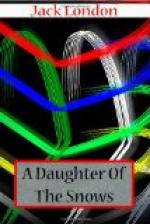“Savve the lingo?” Del demanded.
“Yes; but so poorly, so miserable,” Courbertin demurred. “It is a long time. I forget.”
“Go ahead. We won’t criticise.”
“No, but—”
“Go ahead!” the chairman commanded.
Del thrust the book into his hands, opened at the yellow title-page. “I’ve been itching to get my paws on some buck like you for months and months,” he assured him, gleefully. “And now I’ve got you, you can’t shake me, Charley. So fire away.”
Courbertin began hesitatingly: “’The Journal of Father Yakontsk, Comprising an Account in Brief of his Life in the Benedictine Monastery at Obidorsky, and in Full of his Marvellous Adventures in East Siberia among the Deer Men.’”
The baron looked up for instructions.
“Tell us when it was printed,” Del ordered him.
“In Warsaw, 1807.”
The pocket-miner turned triumphantly to the room. “Did you hear that? Just keep track of it. 1807, remember!”
The baron took up the opening paragraph. “’It was because of Tamerlane,’” he commenced, unconsciously putting his translation into a construction with which he was already familiar.
At his first words Frona turned white, and she remained white throughout the reading. Once she stole a glance at her father, and was glad that he was looking straight before him, for she did not feel able to meet his gaze just them. On the other hand, though she knew St. Vincent was eying her narrowly, she took no notice of him, and all he could see was a white face devoid of expression.
“‘When Tamerlane swept with fire and sword over Eastern Asia,’” Courbertin read slowly, “’states were disrupted, cities overthrown, and tribes scattered like—like star-dust. A vast people was hurled broadcast over the land. Fleeing before the conquerors,’—no, no,—’before the mad lust of the conquerors, these refugees swung far into Siberia, circling, circling to the north and east and fringing the rim of the polar basin with a spray of Mongol tribes.’”
“Skip a few pages,” Bill Brown advised, “and read here and there. We haven’t got all night.”
Courbertin complied. “’The coast people are Eskimo stock, merry of nature and not offensive. They call themselves the Oukilion, or the Sea Men. From them I bought dogs and food. But they are subject to the Chow Chuen, who live in the interior and are known as the Deer Men. The Chow Chuen are a fierce and savage race. When I left the coast they fell upon me, took from me my goods, and made me a slave.’” He ran over a few pages. “’I worked my way to a seat among the head men, but I was no nearer my freedom. My wisdom was of too great value to them for me to depart. . . Old Pi-Une was a great chief, and it was decreed that I should marry his daughter Ilswunga. Ilswunga was a filthy creature. She would not bathe, and her ways were not good . . . I did marry Ilswunga, but she was a wife to me only in name. Then did she complain to her father, the old Pi-Une, and he was very wroth. And dissension was sown among the tribes; but in the end I became mightier than ever, what of my cunning and resource; and Ilswunga made no more complaint, for I taught her games with cards which she might play by herself, and other things.’”




